Massachusetts has a history of leading when it comes to "first of" LGBTQ+ politicians and policies. Gov.-elect Maura Healey is no exception as a queer trailblazer herself.
Congressman Gerry Studds became the first out member of Congress when he was forced to reveal his gayness in 1983 after it was revealed he'd had "a relationship" with a 17-year-old male page. He was censored by Congress while the teen appeared in support of Studds afterward. In May 1987, Congressman Barney Frank became the second out member of Congress -- and the first to voluntarily come out.
Both were continually reelected by their constituents in Massachusetts, with Frank rising to the chairmanship of the House Financial Services Committee, where he helped pass landmark financial legislation, including the Dodd-Frank Act that overhauled financial regulation in the aftermath of the Great Recession of 2007-2008.
Besides reelecting Studds and Frank, Massachusetts in 2004 became the first state in the union to legalize same-sex marriage, as a result of a court decision the previous year.
In 2014, Healey was elected the state's attorney general. Upon taking office, she became the first out lesbian and first out LGBTQ+ person elected attorney general of any state in the U.S.
And that was just the beginning for Healey and her historic firsts.
Last month, she became the first lesbian governor-elect (followed within hours by Oregon's governor-elect, Tina Kotek) in the U.S. when she resoundingly defeated her Republican Geoff Diehl. She's also slated to become the state's first woman governor.
When Healey was called to the microphone to deliver her acceptance speech, she spoke about what her victory meant.
"Tonight, I want to say something to every little girl and every LGBTQ person out there. I hope tonight shows you that you can be whatever, whoever, you want to be," she said.
Healey will be sworn in January 5 (Kotek will be inaugurated four days later), so before the holidays and before Healey officially becomes governor, The Advocate had a chance to catch up with her to talk about her election, how representation is important, and how basketball not only helps her deal with pressure but also enables her to engage with constituents.
Healey says she's proud to be from Massachusetts and for helping pave the way for equality, but she also recognizes that others have also paved the way for her.
"I'm grateful for all those who have gone before me, including Congressmen Frank and Studds as well as former state representative Elaine Noble and former lieutenant governor Evelyn Murphy," Healey says. "I also look back at all the brave folks and the plaintiffs from the Goodridge case in 2003, which was a landmark decision by the Massachusetts Supreme Judicial Court case that required state to legally recognize same-sex marriage. While I'm honored to be the first lesbian governor, I just wish it hadn't taken so long, and I sure hope that I'm not the last."
Healey adds that she knows how important her victory was for the state and America's youth.
"For me, it's all about thinking about the kids," she explains. "I meet so many on the campaign trail, and I know what it means to them to see someone like me up on that stage and winning. When we have more LGBTQ+ people in leadership, we're able to get better results and better policies."
Now that she's won, Healey hopes that her victory empowers other LGBTQ+ people.
"I hope as governor I can make sure that I'm leading the fight against bigotry and discrimination so people can live their lives authentically," she adds.
Regarding her acceptance speech and the reference to girls, did she hear from any young women or anyone from the LGBTQ+ community who heard her message?
"Wow, I'm so grateful to say that I hear from folks all the time. Whether it's events that I attend or letters my office receives, it makes me realize what elective office is all about," she confides. "At our goodbye party in the AG's office recently, I had a person who works in that office who is nonbinary come up to me and thank me for making the work environment so comfortable. It was very emotional. All I was trying to do was be the best AG I could be, and that's the way I'll approach the role of governor. People can't imagine what they can be unless they see somebody doing what they want to do. Representation really matters, particularly in politics and boardrooms."
Healey points out that even in a state like Massachusetts, which is known for its pro-LGBTQ+ policies and attitudes, there's still work to be done, especially when it comes to other parts of the country.
"I know I have to work hard in this state and nationally to help LGBTQ+ kids. When you have LGBTQ+ youth three times more likely to miss school because they don't feel safer or three times more likely to commit suicide, it's so important to make sure they feel safe and that somebody has their back," she says.
With her background in and passion for civil rights, what are Healey's priorities for our community as well as other marginalized communities? "First, it was an honor for me to bring the country's first successful lawsuit challenging the federal Defense of Marriage Act. We took that case to the Supreme Court and won, and it helped change equality across the country and for same-sex couples.
"I want Massachusetts to be a place where people who are born here want to stay and live. Part of that is to make sure the state has vibrancy, opportunities, and a culture of equality, which is so important," Healey says.
Healey explains that she understands that marginalized communities "need to be heard and protected." And that disparities between race, ethnicity, class, gender, gender identity, and sexuality have to be addressed.
"Also, there's a number of issues in Massachusetts related, for example, to attacks on transgender individuals, health care providers, and attacks on schools who have transgender-affirming policies," she says. "These attacks are not coming out of nowhere. They're part of a coordinated campaign from our opponents, and I hope that a Healey administration will lead the efforts to protect us and protect our community from those attacks."
Healey's campaign ads were famous for showing off her basketball prowess. She played basketball during her undergrad days at Harvard and professionally in Australia. Before talking about what basketball and sports means to her, she offered some comments about Brittney Griner.
"I am just so relieved that she is back home," Healey observes. "I was heartsick about her situation, and what she was subjected to. It's just so awful, and as a basketball fan, I'm looking forward to her returning to the WNBA. I also think it's important to remember that here at home we deal with our own anti-LGBTQ forces, and the efforts of some to take us backwards. Those who go after trans kids or those who are homophobic and discriminate against our community. But having Brittney back is certainly great news in a year where that hasn't been that much."
As governor, would Healey relax by shooting some hoops? And did her background in sports help prepare her for being governor?
"It's funny, you know, I find that sports and basketball in particular is a great way to connect with people. While I was on the campaign trail or even in my job as AG, I always tried to find time to play basketball with boys and girls, and youth clubs around the state," she shares. "This year was the 50th anniversary of Title IX [the federal law against sex discrimination in education], and that was momentous, especially for me when I grew up playing sports. It was a huge deal and made so much possible. I think athletics taught me a lot about self-esteem, confidence, resilience and teamwork, and not being afraid. Playing basketball helped a great deal especially when I first ran for office, first got up on a stage, and when I gave my very first speech. And it's helped with other political challenges."
She says that she had to go to Australia to play professional basketball because at the time there wasn't a league for her in the U.S.
"Now look how far we've come with the WNBA and other professional sports leagues for women, but we still have work to do."
And when asked about taking shots, did Healey think she or Transportation Secretary Pete Buttigieg would be the first out LGBTQ+ president?
She responded immediately with laughter.
"Make sure you say I chuckled," she says. "But seriously, I hope someday soon we will see an LGBTQ+ president; however, I just got elected, and I'm excited about the opportunity in front of me, and filled with hope and optimism about what can be accomplished moving forward."
John Casey is editor at large for The Advocate.






























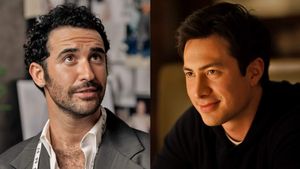









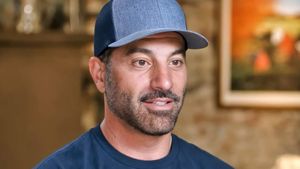


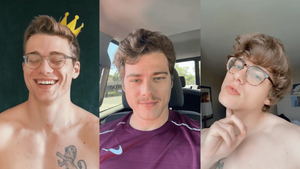



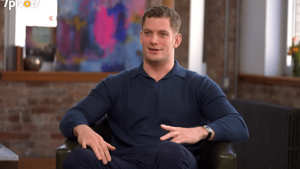





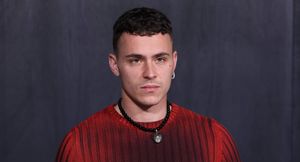






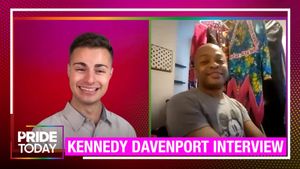





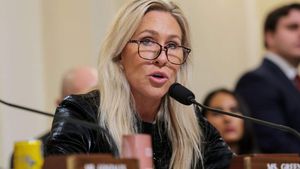


Charlie Kirk DID say stoning gay people was the 'perfect law' — and these other heinous quotes